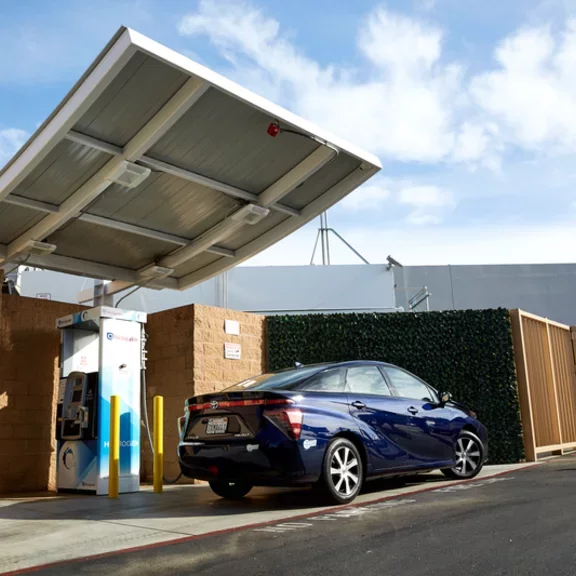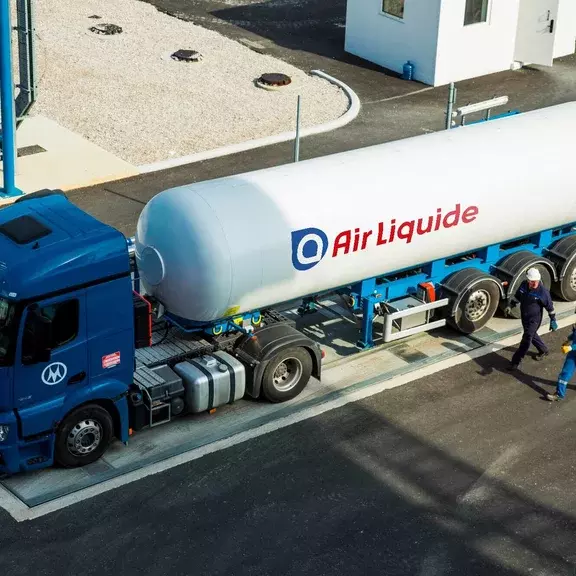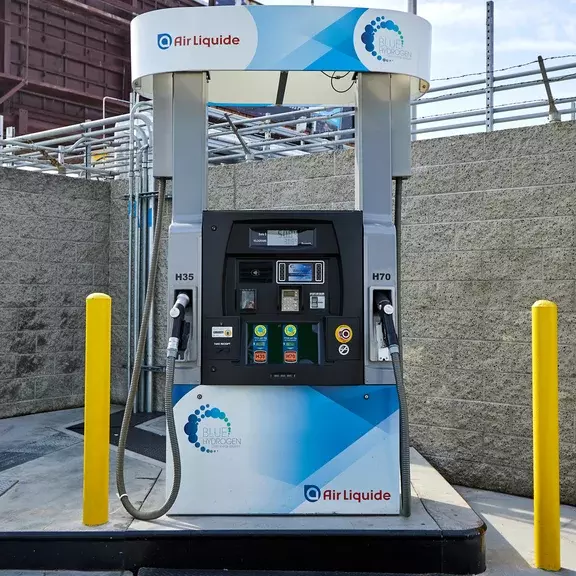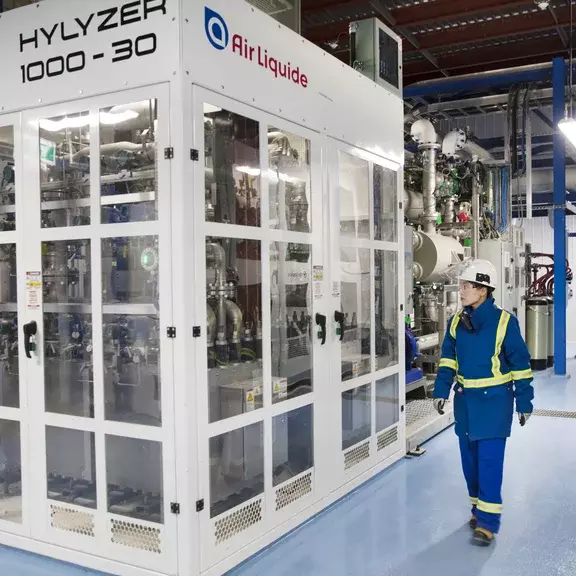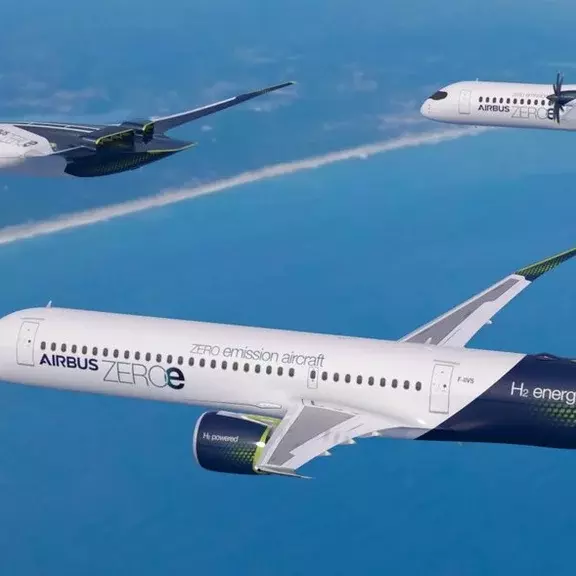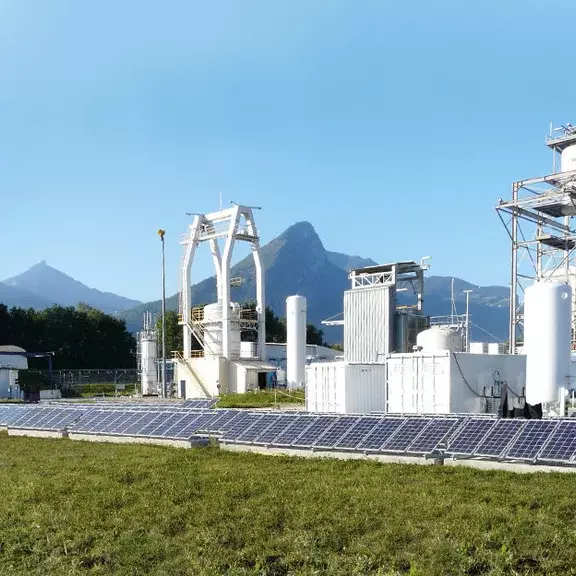H2 Mobility
Hydrogen offers a number of benefits for clean transportation and brings a concrete response to the challenges posed by sustainable mobility and local pollution in urban areas. With clean hydrogen, we can revolutionize clean transportation.
Sustainable Transportation
Air Liquide is a key player in the fast-growing North America hydrogen energy mobility market, producing hydrogen that will serve as fuel for light and heavy-duty vehicles. Hydrogen is fundamental in diversifying and decarbonizing the transportation sector. Air Liquide contributes to the growing use of hydrogen for mobility by investing in the necessary infrastructure, including the network of hydrogen stations and their supply throughout North America and across the world. At this point, 100 hydrogen stations have been designed and built by Air Liquide globally, including nine in the U.S.
Transportation is one of the largest producers of global CO2 emissions, but with the adoption of clean hydrogen at scale, this energy carrier can drive emission reductions in the mobility sector. Air Liquide is actively involved in enabling the widespread use of hydrogen as a clean energy to respond to the challenges of clean transportation: reducing greenhouse gas emissions, pollution in our cities, and dependency on oil-based fuels.
Heavy Duty Applications
Hydrogen fuel cells can best meet the need of heavy-duty vehicles (commercial vehicles, buses, heavy goods vehicles, etc.) to become zero CO₂ and particulates emissions and close-to-zero noise at the point of use. They are particularly efficient for long-distance journeys, which today account for 75% of the transport sector's CO₂ emissions. Our partnership with Faurecia enables us to design and produce on-board liquid hydrogen storage systems for the mobility market. By 2030, fuel cell vehicle production could represent 2.5 million vehicles, of which 20% could be commercial trucks. Due to intensive usage, by 2030, heavy-duty vehicles could represent close to 60% of the hydrogen consumption for mobility markets and high-performance trucks are capable of storing up to 300 liters of liquid hydrogen. Air Liquide is highly engaged in the energy transition for the transport and heavy-duty industry with investments in infrastructures and technologies.
Light Duty Vehicles in the West Coast
Focused on market maturity for clean mobility, we strive to strengthen our presence in the hydrogen mobility market in the west coast, particularly California. With more than 40 stations and more than 40 fuel cell buses in California, we aim to expand the supply of low-carbon hydrogen for the transportation sector. To accomplish this mission, we have partnered with FirstElement Fuel Inc. to supply retail liquid hydrogen fueling stations in California and the growing number of fuel cell cars in the country.
Nevada: Serving the West Coast Mobility Market
The first world-scale liquid hydrogen production unit and logistics infrastructure in North Las Vegas, Nevada, is also dedicated to the mobility market in the west coast by producing, liquefying, and storing hydrogen to supply the hydrogen refueling stations in California. By producing 30 tonnes of liquid hydrogen per day, this plant can serve 40,000 vehicles supplied every day by 2025.
Bécancour: Serving the East Coast Mobility Market
The largest PEM (Proton Exchange Membrane) Electrolyzer in Becancour, Quebec is a fundamental component we have invested in to provide renewable energy to our consumers. Our PEM Electrolyzer can produce 8.2 tonnes per day, which is enough to fuel over 2,000 cars, 16,000 forklifts, 275 buses, or 230 large trucks! This production capacity can supply our North American industrial customers in the U.S. and Canada with decarbonized, high-purity hydrogen to help reduce their carbon footprint.
The maritime transport sector accounts for 3% of CO2 emissions per year on a global scale - hydrogen can serve as a fuel for waterborne transport. As a preferred decarbonization option, hydrogen is expected to play a key role in shipping and marine transportation. We offer new avenues for zero-emission mobility in the maritime transport sector while bringing public awareness and technological innovation for waterborne transportation.
H2 Boats and the Energy Observer 2
As a main partner to Energy Observer, the first hydrogen vessel to travel around the world, we demonstrate the key role of hydrogen in the energy transition and bring our technological and innovation expertise. Energy Observer 2, the world’s first hydrogen-powered cargo ship, houses a complete production line for renewable hydrogen from desalinated sea water injected into an electrolyzer, resulting in zero carbon emissions, zero fine particles, and zero noise. This multipurpose cargo ship is fueled by liquid hydrogen while offering very high transport capacities.
Aviation
Liquid hydrogen has been a signature fuel for aviation and aerospace, including ground logistics such as baggage tractors and forklifts. Hydrogen can also be used to power all flight and communication systems in the cockpit of an aircraft as well as powering lighting, heating, on-board services, and propulsion either by direct combustion or fuel cell powering. The first hydrogen-powered commercial aircraft by Airbus will operate in 2035, and we are proud partners of Airbus and the ADP Group. Zero-emission aviation is the future and the widespread adoption of hydrogen is critical to securing this. The development of hydrogen hubs at airports as well as on-board aircraft technologies will enable us to expand in the aviation sector in the coming decades.
Space
With over 60 years worth of technological contributions to international space programs such as the International Space Station or the European launcher, Air Liquide has always played a vital role in the development of space technology. We develop energy production and storage technologies to support future missions, and have expertise in launch infrastructure, on-board cryogenics, and ground test equipment for launchers and satellites. Liquid hydrogen has played a significant role in space exploration. With so many benefits, including its low molecular weight and high energy output, hydrogen continues to keep its promise as a reliable rocket propellant in the space industry. Air Liquide is dedicated to also engage in all major new international challenges: electric propulsion, more competitive launch vehicles, constellation of satellites, life in space, and more.
